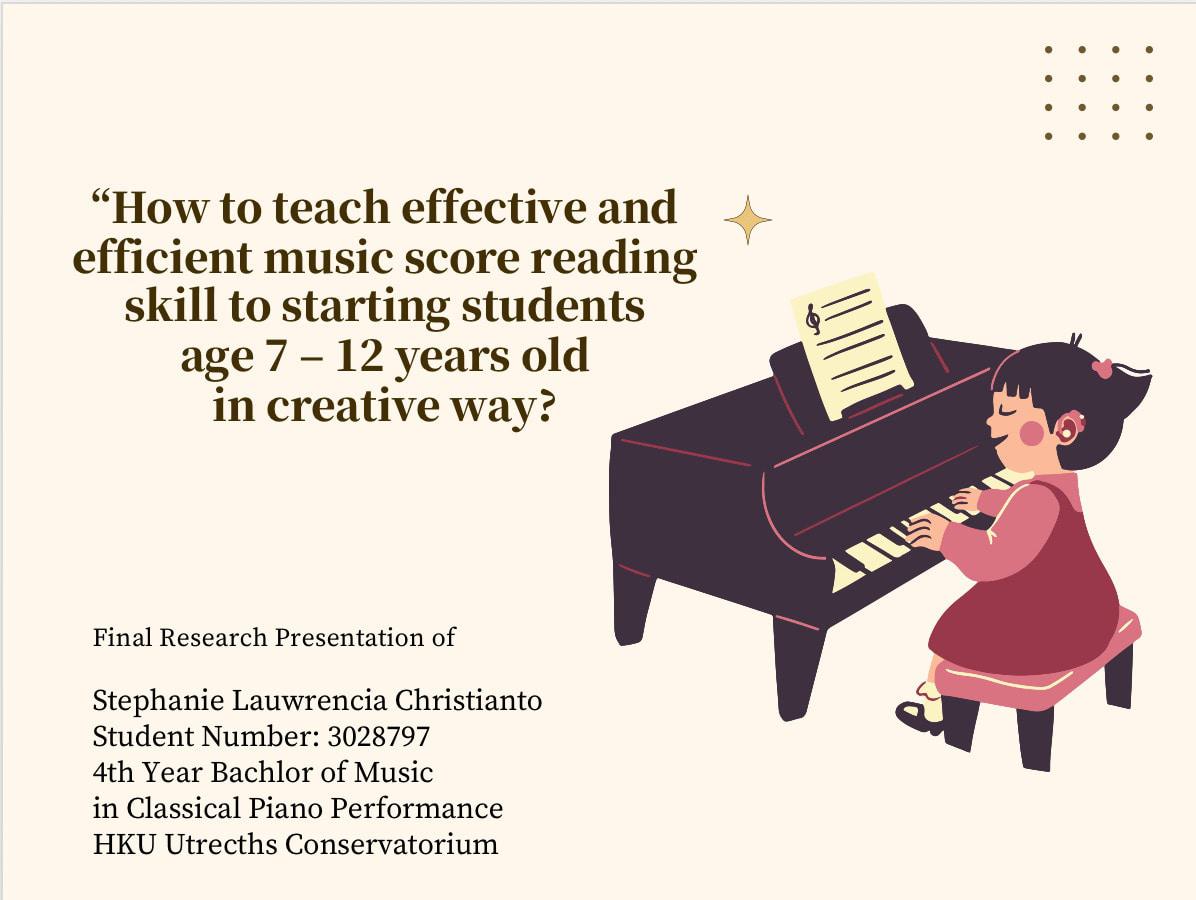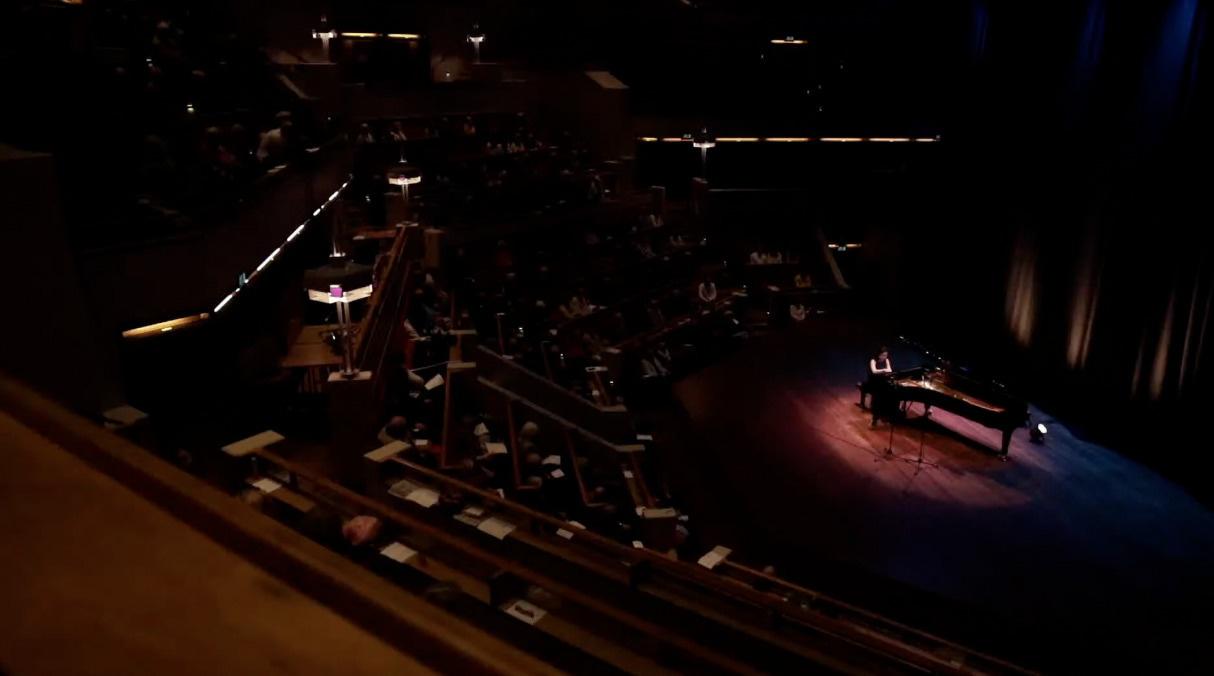Music is a universal language, like a saying of “when words fail, music speaks”. It is because music has the ability to express one’s feelings and unlock hidden emotions through melody, harmony, rhythm, dynamics, articulation, and other musical ornamentations. Music consists of several genre i.e. classical, jazz, pop, and more. However, the first ultimate step of all in order to understand the pieces or songs themselves are through music score.
Score manuscript has a crucial role in the process of music making. When we say that “Music” is a universal language, it needs tools such as its own alphabets, words, phrasing, exclamation marks and more things to be able to be understood by the performer, which the message of the music will later on be delivered to the audience through a music performance. Therefore, as comparison, when words consist of alphabets, musical notations consist of notes stacked on a musical stave as a musical symbol.
Music reading (reading music notations in a score manuscript written by its composer) is always inseparable to the process of mastering classical piano pieces. However, there are some challenges one may have during the learning process of mastering music score reading.
To train oneself to master this skill requires awareness to small details and sharp eyesight to distinguish each line where the notes are placed. This is why these kinds of processes may be complicated for a beginner, especially for children, as bullets and lines might be too abstract to understand. Therefore, several learning methods are needed to support the development of music score reading skills.
Thus, it is very important for both piano student and teacher to perform effective and efficient way of practicing in order to achieve their goal in conquering music reading skill holistically.
The purpose of this research is to share insights for piano teachers of how they can develop music reading skills for young children to be more engaging and encouraging for students range of age 7 – 12 years old. This research will highlight the importance of developing music reading skills in the early stage of childhood music education, as it will be one of the crucial foundations in the children’s development when they will later on move into higher piano levels.
This study could be implemented into music education practitioners, especially for those who focus mainly on children’s education. The research shares knowledge and information of music reading learning approach which can be useful for piano teachers. Educators may benefit from this research to figure out teaching ideas of music reading practices.

Artist statement
Stephanie Lauwrencia Christianto, born in 2000 is an Indonesian pianist, organist, and composer. She is currently a final year student at HKU Utrecht Conservatorium majoring in Classical Piano Performance under Klara Wurtz. Besides, she is also pursuing double honors track program in Organ and Composition under the guidance of Reitze Smits and Caroline Ansink respectively.
She was prizewinner of numerous piano competitions, among others: Essex Indonesia Piano Competition, Yamaha Piano Competition, Indonesia Steinway Youth Piano Competition, 2nd Winner and The Best Intepreter for Classical Music Award of Nusantara Piano Competition by Ananda Sukarlan, 1st Winner at Elly Lim Music Festival, and Prinses Christina Concours in The Netherlands.
Ambitions
I would like to pursue my dream to be a professional and reputable musician, who beautifully performs classical music in piano solo, pipe organ, chamber music, composition, and to be a teacher of the next generation.
Learned during the studies
I’m grateful to have the opportunity to pursue classical piano, organ, and composition at HKU Utrechts Conservatorium. I realize that studying various instruments will enrich my views of music. Learning other perspectives will also build my competency as I work to become a next generation musician.
List of publications / exhibitions / prices / concerts / shows etc.
Social Media:
Instagram: @stephaniepianist
YouTube: Stephanie Pianist
Recent Performance Link:
https://www.youtube.com/watch?v=NfFm3SlgZOw
Final Exam Recital:
Date/Time: 16 June 2022 at 7 pm
Venue: Fentener van Vlissingenzaal, HKU Utrechts Conservatorium, The Netherlands
Tari Kecak (Composition for Saxophone Quartet) by Stephanie Lauwrencia Christianto
Composer: Stephanie Lauwrencia Christianto
Instrument(s): Solo Piano
Program Notes: Longing for home in Jakarta, anxiety, worry, and sorrow as a new pandemic strikes our world. Me recalled the joy of singing Kicir-Kicir, a Jakarta folklore, telling people that singing may bring joy and healing. So we are calling all mankind, let’s work together, hand in hand, because we shall prevail!
YouTube Link: https://www.youtube.com/watch?v=vOQpE33D4YM
Composition Title: Tari Kecak
Composer: Stephanie Lauwrencia Christianto
Instrument(s): Saxophone Quartet
Program Notes: Kecak Dance (Tari Kecak, Dutch Prononciation "Ketjak") is a Balinese Dance from Hindu tradition which was developed in the 1930s in Bali, Indonesia. Kecak Dance is mainly performed by 50-150 men. This dance is based on the story of the Ramayana and is traditionally performed in temples and villages across Bali for both religious and tourism event.
Composition Title: Isolation, I. Enigma, Trio for Flute, Cello, and Piano
Composer: Stephanie Lauwrencia Christianto
Instrument(s): Flute, Cello, and Piano
Program Notes: This trio of Isolation for flute, cello, and piano is inspired from the feeling of being isolated from the outside world due to the nowadays circumstances. The first movement of Enigma portrays the mysterious world full of uncertainty.
YouTube Link: https://youtu.be/qc4iBspqb84


